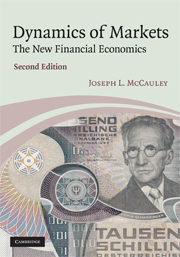Book contents
- Frontmatter
- Contents
- Preface to the second edition
- 1 Econophysics: why and what
- 2 Neo-classical economic theory
- 3 Probability and stochastic processes
- 4 Introduction to financial economics
- 5 Introduction to portfolio selection theory
- 6 Scaling, pair correlations, and conditional densities
- 7 Statistical ensembles: deducing dynamics from time series
- 8 Martingale option pricing
- 9 FX market globalization: evolution of the Dollar to worldwide reserve currency
- 10 Macroeconomics and econometrics: regression models vs empirically based modeling
- 11 Complexity
- References
- Index
7 - Statistical ensembles: deducing dynamics from time series
Published online by Cambridge University Press: 02 December 2010
- Frontmatter
- Contents
- Preface to the second edition
- 1 Econophysics: why and what
- 2 Neo-classical economic theory
- 3 Probability and stochastic processes
- 4 Introduction to financial economics
- 5 Introduction to portfolio selection theory
- 6 Scaling, pair correlations, and conditional densities
- 7 Statistical ensembles: deducing dynamics from time series
- 8 Martingale option pricing
- 9 FX market globalization: evolution of the Dollar to worldwide reserve currency
- 10 Macroeconomics and econometrics: regression models vs empirically based modeling
- 11 Complexity
- References
- Index
Summary
We now begin our ascent toward the main peak of our effort, although there are still interesting and useful peaks to climb in the remaining chapters. The theories of stochastic processes and probability are put to work below to address the central question: can we reliably deduce a model or class of dynamic models from a single time series, where “systematically rerunning the experiment” is impossible? If so, then how, and what are the main pitfalls to be avoided along the way? With detrended data in mind, the two classes of dynamics of interest are those with and without increment autocorrelations: Martingales vs everything else. We will also see that Wigner's analysis applies (Chapter 1): unless we can find an inherent statistical repetitiveness to exploit, then the effort is doomed in advance. We will exhibit the required statistical repetition for FX data, and also show how a class of diffusive models is implied. Because we work with detrended time series (this would be impossible were the increments correlated), attention must first be paid to restrictions on detrending Ito processes.
Detrending economic variables
Prices are recorded directly but we'll study log returns of prices. The use of logarithms of prices is common both in finance and macroeconomics. Before the transformation can be made from price to log returns, a price scale must be defined so that the argument of the logarithm is dimensionless.
- Type
- Chapter
- Information
- Dynamics of MarketsThe New Financial Economics, pp. 148 - 175Publisher: Cambridge University PressPrint publication year: 2009



